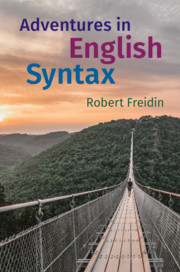Book contents
- Adventures in English Syntax
- Adventures in English Syntax
- Copyright page
- Contents
- Preface
- Acknowledgments
- Additional material
- 1 an adventure in ambiguity with one fish two fish
- 2 exceptional students and teachers
- 3 Introduction to Language and Linguistics
- 4 a review of a book by two philosophers
- 5 Bob is certain to succeed.
- 6 It is a truth universally acknowledged, that a single man in possession of a good fortune must be in want of a wife.
- 7 Does every politician who cheats instinctively lie?
- 8 Inferior defenses could then, as now, be tackled, as Vernon did at Porto Bello, Exmouth at Algiers, & Seymour at Alexandria.
- Glossary
- References
- Index
4 - a review of a book by two philosophers
Published online by Cambridge University Press: 10 February 2020
- Adventures in English Syntax
- Adventures in English Syntax
- Copyright page
- Contents
- Preface
- Acknowledgments
- Additional material
- 1 an adventure in ambiguity with one fish two fish
- 2 exceptional students and teachers
- 3 Introduction to Language and Linguistics
- 4 a review of a book by two philosophers
- 5 Bob is certain to succeed.
- 6 It is a truth universally acknowledged, that a single man in possession of a good fortune must be in want of a wife.
- 7 Does every politician who cheats instinctively lie?
- 8 Inferior defenses could then, as now, be tackled, as Vernon did at Porto Bello, Exmouth at Algiers, & Seymour at Alexandria.
- Glossary
- References
- Index
Summary
Continues discussion of ambiguities involving prepositional phrase modifiers in this case, in a complex noun phrase containing two such modifiers, where the two distinct interpretations correspond to two distinct hierarchical structures. This ambiguity is preserved when the prepositional phrase expands to a verb phrase, and also when this verb phrase expands to a finite clause, a relative clause modifying a noun. This serves as a basis for the syntactic analysis of relative clauses and of finite clauses more generally. Discusses how the VP modifier can create garden path effects in standard English, but not in other varieties. Extends analysis of relative clauses to infinitivals, which in some cases require ending the clause with a preposition. Contrasts the natural syntax of English with prescriptive rules prohibiting a stranded preposition at the end of a clause/sentence, a “split infinitive” where an adverb separates infinitival to and a verb, and the use of which in restrictive relative clauses – showing how these prohibitions are not well grounded.
Keywords
- Type
- Chapter
- Information
- Adventures in English Syntax , pp. 53 - 93Publisher: Cambridge University PressPrint publication year: 2020



